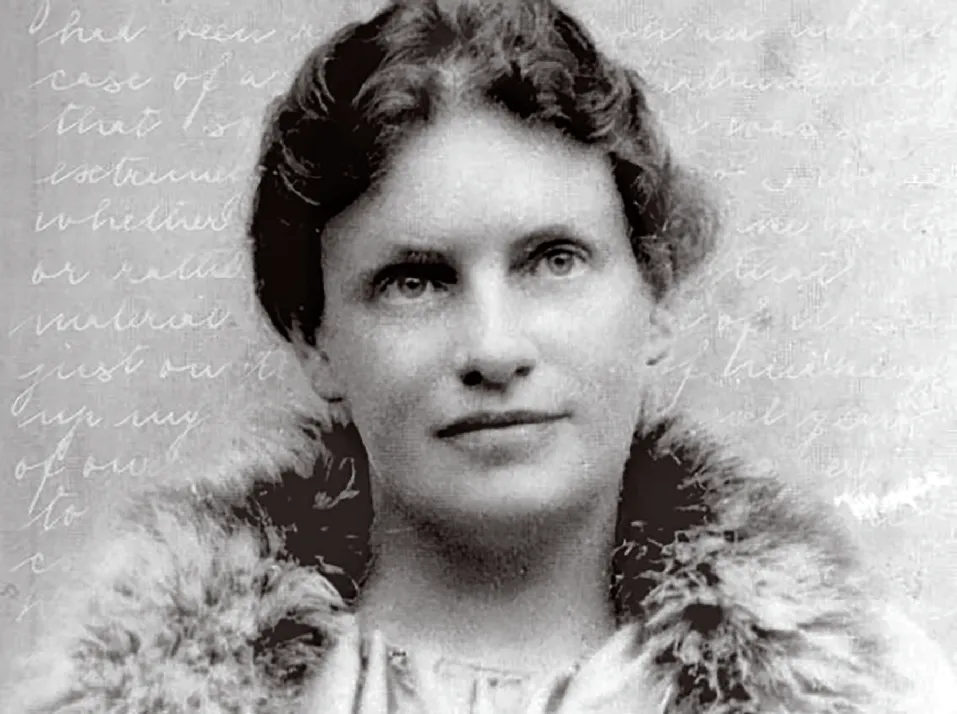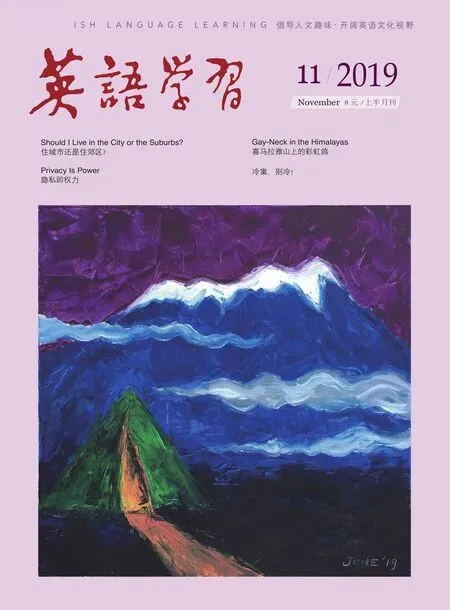CRainer Maria Rilke,YourVery Name Is a Poem
Rachel Corbett
∷蒋素华 选注
Indeed, it was a death thatchaperoned(陪伴)the poet's very entrance into the world, on December 4, 1875.A young housewife from a well-to-do family, Sophia Rilke lost an infant girl a year before giving birth to her only son.From the moment he was born, she saw him as her replacement daughter and christened him with the feminine name René Maria Rilke.Sometimes she called him by her own nickname, Sophie.Born two monthsprematurely(早产地), the boy stayed small for his age andpassed easily
for(很容易被当作)a girl.His motheroutfitted(穿戴)him in ghostly white dresses and braided his long hair until he entered school.Thissplintered(分裂的)identity had mixed consequences for Rilke.On the one hand, he grew up believing that there was something fundamentally mistaken about his nature.But on the other hand, hisacquiescence(默许,顺从)pleased his mother, which was something no one else seemed able to do, especially not his father.

雷纳·玛丽亚·里尔克

卢·安德烈亚斯·莎乐美
Josef Rilke worked for the Austrian army as a railroad station master.He never rose to the officer's rank that his well-bred wife had hoped for, and he spent the rest of his marriage paying for the disappointment.His good looks and early professional promise initially won his bride over, but Sophia prized status above all else and never forgave Josef for failing to bring her the noble title she bargained for.
Josef, meanwhile, resented the way he babied René,and later blamed her for the boy's incessantversifying(作诗).He was not mistaken.Sophia had decided that if they weren't going to be granted nobility, they would fake it, and so she began teaching René poetry in an attempt to “refine” him.She had him memorizing Friedrich Schiller1.弗里德里克·席勒(1759—1805),德国诗人、剧作家,对德国文学具有重要和深远的影响。verses before he could read and copying entire poems by age seven.She insisted he learn French, too,but certainly not Czech.Under the imperial rule of the Austro-Hungarian Empire, Czech wasrelegated(被贬为)to the servant classes, while German became the dominant language in Prague.
Born into thissegregated(被隔离的)city, Rilke quickly discovered that gender was not the only boundary that proved contradictory in his early life.He was part of Prague's German-speaking minority, which enjoyed vast cultural and economic advantages over the Czech majority.Liberal families like the Rilkes wanted to live peacefully alongside theSlavs(斯拉夫人), but they kept to their own schools, theatres and neighborhoods,delineated(用……勾画)by street signs written in their own language.Rilke would go on to speak Russian, Danish and French, but he always regretted never learning the language native to his homeland.
Young Rilke longed only to join the adult world.He was too intellectual to keep company with the workingclass boys and he wasn't refined enough for the aristocratic ones.Solitude might have suited him fine, but he wouldn't be so lucky.To his classmates, René was fragile,precocious(早熟的)and a moral scold—all qualities that aligned into idealcrosshairs(瞄准线,喻指对象)for bullies.
In any case, the sickroom became Rilke'ssanctuary(避难所)at military school.It provided immediate asylum from hisantagonizers(对抗者)and, more importantly, allowed him time and space to read.Lying in bed, he rolled around with sentences day and night.He cried into pages of Goethe2.歌德(1749—1832),德国最伟大的作家之一,他还是著名的思想家、科学家,代表作有《少年维特之烦恼》和《浮士德》。.His grades in literature classes started to improve, though they dropped in fencing and gym.Despite his failing physical education,Rilke still thought he could be a military officer, and at one point tried to prove it to his instructors by writing an eightypage “History of the Thirty-Years War.”
At the suggestion of teachers, the boy began submitting poems to newspapers, and several were accepted.He survived on these small consolations until he turned fifteen,when, finally, his parents saved him from that “dungeon(地牢)of childhood,” as he called the academy.But hefared(进展,成功)no better at the business school they sent him to next in the Austrian town of Linz3.林茨,奥地利第三大城市。.Noticing with“scorn and uneasiness” that his son was still writing poems,Josef tried to convince René to focus more on his studies and write only on the weekends.He saw no reason why his son couldn't maintain both a job and a hobby, which was how he saw poetry.But to René, his poems were his “dream children,” and nothing was more upsetting than the thought of sacrificing them to a dull office job.He had decided that the artist who only wrote on the weekends was “not an artist at all.”
When Rilke'spsychodramatic(心理剧的)playwriting fared no better, he did not consider the possibility that his work was amateur.Instead, he blamed readers for failing to understand it.Prague was a town of thebygone(过去的事), filled with graveyards, castles andparochialdilettantes(狭隘的艺术爱好者), he concluded.The people there were so stuck in the past they even looked old.“The only progress they know is when their coffins rot to pieces or their garments fall apart,” he wrote.While Rilke admired many Slavic traditions, including their folk history and reverence for the land, the people were too poor to concern themselves with literary pursuits.The Austrians were worse because they could afford to embrace the arts, but cared only about status and money.
When Rilke turned twenty, he realized that if his poetry didn't take off soon his parents would have their doubtsvalidated(被证实的).He would be forced to take a job at a bank or law firm in Prague and stay there, maybe forever.The city was not an environment hospitable to creativity, with its air that could hardly“be breathed, thick withstale(空气污浊的)summer and unconquered childhood,” he wrote.
Rilke had met young people who moved to cities known for nurturing artists.Many had gone to Paris, but Rilke believed the French exerted too much influence over the artistic production of Eastern Europe.He saw a better option in Munich, then the intellectual nerve center of Europe, where the mostcoveted(梦寐以求的)social seat in town was at the lecture hall.At the cafés, secular youth debated Nietzsche's4.尼采(1844—1900),德国哲学家、语言学家、文化评论家、诗人和思想家。主要著作有《权力意志》《悲剧的诞生》《不合时宜的考察》等。declaration of “the death of God,” while the artists revolted against the academy, resulting in the Munich Secession5.慕尼黑分离派,是一些视觉艺术家于1892年创办的协会,反对慕尼黑艺术家协会的保守和家长制作风,他们以合作的形式增加影响力以便确保获得佣金并得以生存,促进和捍卫他们的艺术。of 1892—five years before Gustav Klimt6.古斯塔夫·克利姆特(1862—1918),奥地利象征主义画家,“维也纳分离派”奠基人。led the movement in Vienna.
The German doctor Wilhelm Wundt7.威廉·冯特(1832—1920),德国生理学家、心理学家和哲学家,被公认为是实验心理学之父。accidentally forged the birth of psychology in the 1860s, while he was conducting some routine research on reaction times.He hadrigged(装置)thependulum(钟摆)of a clock into a timer he called a “thought meter,” when it occurred to him that perhaps his experiment measured not only a neurological phenomenon, but an unconscious one.Reaction times seemed to bridge the gap between voluntary attention, between the brain and the mind.If science could measure the former, he couldn't see why it wouldn't also apply to the latter.In 1879, Wundt founded the world's first laboratory for psychological experimentation inLeipzig(莱比锡,德国城市).
It took a philosopher from the next generation, Theodor Lipps8.西奥多·立普斯(1851—1914),德国哲学家,以其美学的理论而闻名,将“移情”定义为“将自己投射到感知对象上”,并开辟了心理学和哲学之间跨学科研究的新分支。to draw the link between Wundt's new discipline and his own, aesthetics.Lipps had been forerunner in the creation ofphenomenology(现象学), but started to break away from the field and its figurehead, Edmund Husserl9.埃德蒙·胡塞尔(1859—1938),德国唯心主义哲学家,现象学创始人。, in order to pursue a psychological approach to his central question: Why does art give us pleasure?
Lipps found a name for his theory in an 1873dissertation(论文)by a German aesthetics student named Robert Vischer.When people project their emotions, ideas or memories onto objects they enact a process that Vischer calledeinfühlung, literally “feeling into.” The British psychologist Edward Titchener translated the word into English as “empathy”(移情)in 1909, deriving it from the Greekempatheia, or “inpathos(同情).”
Empathy explained why people sometimes describe the experience of “losing themselves” in a powerful work of art.Maybe their ears deafen to the sounds around them, the hair rises on the backs of their necks or they lose track of the passage of time.Something produces a “gut feeling”(直觉)or triggers a flood of memory, like Proust's10.普鲁斯特(1871—1922),《追忆逝水年华》的作者,20世纪法国最伟大的小说家之一,意识流文学的先驱与大师。madeleine(玛德琳蛋糕).When a work of art is effective, it draws the observer out into the world, while the observer draws the work back into his or her body.Empathy was what made red paint run like blood in theveins(静脉), or a blue sky fill the lungs with air.
But it was psychologists who transformed the obscure term from German art history into the cornerstone of human emotion that we understand as empathy today.In Vienna, the young professor Sigmund Freud11.西格蒙德·弗洛伊德(1856—1939),奥地利精神病医师、心理学家、精神分析学派创始人,著有《梦的解析》。wrote to a friend in 1896 that he had “immersed”himself in the teachings of Lipps, “who I suspect has the clearest mind among present-day philosophical writers.”Several years later, Freud thanked Lipps for giving him“the courage and capacity” to write his bookJokes and Their Relation to the Unconscious.
Apart from Lipps's class, Rilke signed up for courses on Darwin and Renaissance art, taking an especially keen interest in the paintings of Sandro Botticelli12.桑德罗·波堤切利(1445—1510),意大利著名画家,欧洲文艺复兴早期佛罗伦萨画派的代表画家,以圣母子像而闻名。, whose sad, pleading-eyedMadonnas(圣母玛利亚)seemed to “stand at the heart of the longing of our time.”
Soon enough, Rilke found himself moving within social circles alongside Siegfried Wagner, the composer's son, and Jakob Wassermann, the German writer, Jens Peter Jacobsen,13.此处提及的三个人依次为:西格弗里·瓦格纳(1869—1930),德国作曲家及指挥,著名作曲家理查德·瓦格纳的儿子;雅各布·瓦色尔曼(1873—1934),德国犹太裔作家、小说家;延斯·彼得·雅各布森(1847—1885),丹麦小说家,诗人和科学家。他开始了丹麦文学中的自然主义运动,并成为北欧“现代突破”文学运动的一部分,代表作为《尼勒斯·莱尼》。whose book about a young “dreamer,floundering(挣扎)around in aslough(泥沼)of doubts and self-analysis,” Niels Lyhne, would become an essential source of comfort to Rilke for years to come.But even this would not compare with the gift Wassermann gave him when, in 1897, he introduced the poet to Lou Andreas-Salomé14.卢·安德烈亚斯·莎乐美(1861—1937),一位才华横溢的女作家,她是俄罗斯流亡贵族的女儿,特立独行的女权主义者;她为尼采所深爱、受弗洛伊德赏识、与里尔克同居同游,是19世纪晚期欧洲大陆知识沙龙界的“玫瑰”。.For a woman of any era, Andreas-Salomé's intellectual influence was extraordinary.For a radical Russian feminist in the nineteenth century, it was almostinconceivable(不可思议的).
Louise von Salomé, as she was named at birth, was an accomplished philosopher and writer, but today she is better remembered as amuse(缪斯,灵感的源泉).She had rejected two marriage proposals from Friedrich Nietzsche,who once called her “by far the smartest person I ever knew,” and another from Nietzsche's friend the philosopher Paul Rée15.保罗·李(1849—1901),德国作家和哲学家,也是尼采的朋友。.Although she didn't want to marry either man,she was fascinated by their minds and suggested they all live together in an intellectual “holy trinity.” Astonishingly,they agreed.
Andreas-Salomé's main gift was her acutelyanalytical(善于解析的)mind.She had anuncanny(神秘的,离奇的)ability to comprehendabstruse(深奥的)ideas from the era's mostformidable(令人敬畏的)thinkers,often illuminating aspects of their own arguments that they had not even conceived.She was a kind of intellectualtherapist(治疗师): listening, describing, analyzing and repeating back their ideas in order to illuminate the places where shadows fell in their logic.
Rilke added himself to Andreas-Salomé's long list of admirers almost from the moment he learned of her existence.He had just written his “Visions of Christ” cycle,a Nietzsche-inspired challenge to Christian dogma, when an editor friend suggested he read her essay on similar themes, “Jesus the Jew.”
Rilke felt for Andreas-Salomé the kind of reckless passion he would later ascribe to young people who “fling themselves at each other, when love takes possession of them, scatter themselves, just as they are, in all their untidiness, disorder, confusion.” Andreas-Salomé did not return Rilke'sunhinged(错乱的)adoration, but she began to genuinely appreciate his talent and believed that the qualities she disliked in him could be fixed with a littlegrooming(调教).She began to mold the poet into a version of himself that she found more attractive.She advised him to copy hercourtly(典雅的)style of handwriting and to cultivate hismasculinity(男子气概).The name René was too French and feminine, she said, and suggested he change it to the sturdier, Gemanic Rainer.
The poet hungered to become her creation.More than his first great lover, Andreas-Salomé was hisconfidante(知己), his mentor, his muse, even a kind of mother—if not to the young man, then at least to the artist maturing inside him.“I am still soft, I can be like wax in your hands.Take me, give me a form, finish me,” he wrote in an autobiographical story when he met her.Rilke welcomed her rechristening him with thisenigmatic(谜一般的)new name, which would take on an almost mythical identity of its own.To the author Stefan Zweig16.斯蒂芬·茨威格(1881—1942),奥地利著名作家、小说家和传记作家。, the letters looked as if they ought to be hammered into find threads of gold.“Rainer Maria Rilke,” wrote another friend, “your very name is a poem.”

